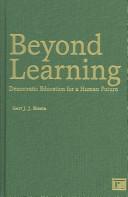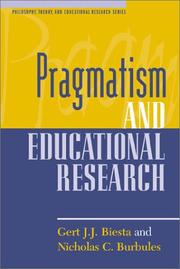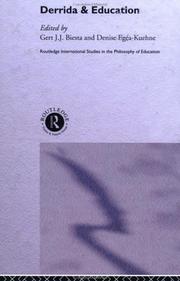| Listing 1 - 10 of 14 | << page >> |
Sort by
|
Book
ISBN: 9781594517914 9781594517907 1594517908 1594517916 1317258665 1315634317 1317258657 Year: 2010 Publisher: Boulder Paradigm
Abstract | Keywords | Export | Availability | Bookmark
 Loading...
Loading...Choose an application
- Reference Manager
- EndNote
- RefWorks (Direct export to RefWorks)
371.014 --- Onderwijspolitiek --- Education ¡ Aims and objectives --- Educational tests and measurements --- Effective teaching --- School improvement programs --- Political aspects. --- Education ¡ Aims and objectives. --- Effective teaching. --- School improvement programs. --- 371.014 Onderwijspolitiek --- Improvement programs, School --- Instructional improvement programs --- Programs, School improvement --- School self-improvement programs --- School management and organization --- Instructional effectiveness --- Teaching effectiveness --- Teaching quality --- Teaching --- Teacher effectiveness --- Educational assessment --- Educational measurements --- Mental tests --- Tests and measurements in education --- Psychological tests for children --- Psychometrics --- Students --- Examinations --- Psychological tests --- Political aspects --- Rating of

ISBN: 1594512337 9781594512339 9781594512346 9781315635811 9781317263142 9781317263159 Year: 2006 Publisher: Boulder Paradigm
Abstract | Keywords | Export | Availability | Bookmark
 Loading...
Loading...Choose an application
- Reference Manager
- EndNote
- RefWorks (Direct export to RefWorks)
Many educational practices are based upon ideas about what it means to be human. Thus education is conceived as the production of particular subjectivities and identities such as the rational person, the autonomous individual, or the democratic citizen. Beyond Learning asks what might happen to the ways in which we educate if we treat the question as to what it means to be human as a radically open question; a question that can only be answered by engaging in education rather than as a question that needs to be answered before we can educate. The book provides a different way to understand and approach education, one that focuses on the ways in which human beings come into the world as unique individuals through responsible responses to what and who is other and different. Beyond Learning raises important questions about pedagogy, community and educational responsibility, and helps educators of children and adults alike to understand what a commitment to a truly democratic education entails
Education --- Education, Humanistic. --- Pedagogiek en onderwijskunde --- Aims and objectives. --- Philosophy. --- fundamentele pedagogiek --- S20110238.JPG --- opvoeding --- pedagogie --- democratie --- 37 --- 32 --- fundamentele pedagogiek. --- Fundamentele pedagogiek. --- Education, Humanistic --- Aims and objectives of education --- Educational aims and objectives --- Educational goals --- Educational objectives --- Educational purposes --- Goals, Educational --- Instructional objectives --- Objectives, Educational --- Purposes, Educational --- Educational sociology --- Education, Liberal --- Humanistic education --- Liberal arts education --- Liberal education --- Classical education --- Aims and objectives --- Philosophy
Book
ISBN: 9460915124 9460915116 Year: 2011 Publisher: Rotterdam : SensePublishers : Imprint: SensePublishers,
Abstract | Keywords | Export | Availability | Bookmark
 Loading...
Loading...Choose an application
- Reference Manager
- EndNote
- RefWorks (Direct export to RefWorks)
This book explores the relationships between education, lifelong learning and democratic citizenship. It emphasises the importance of the democratic quality of the processes and practices that make up the everyday lives of children, young people and adults for their ongoing formation as democratic citizens. The book combines theoretical and historical work with critical analysis of policies and wider developments in the field of citizenship education and civic learning. The book urges educators, educationalists, policy makers and politicians to move beyond an exclusive focus on the teaching of citizenship towards an outlook that acknowledges the ongoing processes and practices of civic learning in school and society. This is not only important in order to understand the complexities of such learning. It can also help to formulate more realistic expectations about what schools and other educational institutions can contribute to the promotion of democratic citizenship. The book is particularly suited for students, researchers and policy makers who have an interest in citizenship education, civic learning and the relationships between education, lifelong learning and democratic citizenship. Gert Biesta (www.gertbiesta.com) is Professor of Education at the School of Education, University of Stirling, UK.
Citizenship -- Study and teaching. --- Continuing education. --- Democracy -- Study and teaching. --- Democracy and education. --- Education. --- Lifelong learning. --- Adult education. --- Lifelong Learning/Adult Education. --- Adults, Education of --- Education of adults --- Education --- Continuing education --- Open learning --- Lifelong education --- Lifelong learning --- Permanent education --- Recurrent education --- Adult education --- Children --- Education, Primitive --- Education of children --- Human resource development --- Instruction --- Pedagogy --- Schooling --- Students --- Youth --- Civilization --- Learning and scholarship --- Mental discipline --- Schools --- Teaching --- Training --- Citizenship --- Democracy --- Study and teaching. --- Education and democracy
Book
ISBN: 9789004401082 Year: 2019 Publisher: Leiden ; Boston : Brill Sense,
Abstract | Keywords | Export | Availability | Bookmark
 Loading...
Loading...Choose an application
- Reference Manager
- EndNote
- RefWorks (Direct export to RefWorks)
"What should the relationship between school and society be? Obstinate Education: Reconnecting School and Society argues that education is not just there to give individuals, groups and societies what they want from it, but that education has a duty to resist. Education needs to be obstinate, not for the sake of being difficult, but in order to make sure that it can contribute to emancipation and democratisation. This requires that education always brings in the question whether what is desired from it is going to help with living life well, individually and collectively, on a planet that has a limited capacity for giving everything that is desired from it. This book argues that education should not just be responsive but should keep its own responsibility; should not just focus on empowerment but also on emancipation; and, through this, should help students to become 'world-wise.' It argues that critical thinking and classroom philosophy should retain a political orientation and not be reduced to useful thinking skills, and shows the importance of hesitation in educational relationships. This text makes a strong case for the connection between education and democracy, both in the context of schools, colleges and universities and in the work of public pedagogy"-- Pàgina 4 de la coberta.
Book
Year: 2015 Publisher: Z.p. Phronese
Abstract | Keywords | Export | Availability | Bookmark
 Loading...
Loading...Choose an application
- Reference Manager
- EndNote
- RefWorks (Direct export to RefWorks)
Pedagogiek --- Onderwijsfilosofie --- Onderwijsvernieuwing --- Innovatie

ISBN: 0847694763 0847694771 9780847694761 9780847694778 Year: 2003 Publisher: Totowa Rowman & Littlefield
Abstract | Keywords | Export | Availability | Bookmark
 Loading...
Loading...Choose an application
- Reference Manager
- EndNote
- RefWorks (Direct export to RefWorks)
Education --- Pragmatism. --- Philosophy. --- Research --- Methodology. --- Dewey, John, --- Contributions in education. --- #PBIB:2004.1 --- Pragmatism --- Idealism --- Knowledge, Theory of --- Philosophy --- Philosophy, Modern --- Positivism --- Realism --- Utilitarianism --- Experience --- Reality --- Truth --- Children --- Education, Primitive --- Education of children --- Human resource development --- Instruction --- Pedagogy --- Schooling --- Students --- Youth --- Civilization --- Learning and scholarship --- Mental discipline --- Schools --- Teaching --- Training --- Research&delete& --- Methodology --- Tu-wei, --- Tu-wei, Yüeh-han, --- Dyui, --- Dʹi︠u︡i, Dzhon, --- Dyuʼi, G'on, --- Дьюи, Джон, --- ديوى، جون، --- 杜威, --- Dīvīy, Jān, --- ديويي، جان --- Dīwʼī, Jān, --- Dīwiʼī, Jān, --- ديوئى، جان --- Diyūʼī, Jān, --- Dyūwi, Jon, --- Dyūi, Jon, --- デューウィジョン, --- デューイジョン, --- ジョン・デューウィ, --- ジョン・デューイ, --- Education - Philosophy. --- Education - Research - Methodology. --- Dewey, John, - 1859-1952 - Contributions in education. --- Dewey, John, - 1859-1952
Book
ISBN: 9789400740174 Year: 2012 Publisher: Dordrecht Springer Netherlands
Abstract | Keywords | Export | Availability | Bookmark
 Loading...
Loading...Choose an application
- Reference Manager
- EndNote
- RefWorks (Direct export to RefWorks)
This volume gives educational theorists the chance to let rip and say what they really want to say. In doing so it sends a blast of fresh air through the dusty halls of academe. The vast majority of the literature in education theory and philosophy follows the conventions of academic writing, and rightly so. Yet its formal, abstract and objective style, which focuses on the careful presentation of theoretical and philosophical arguments, doesn't always give us insights into what motivates and drives the authors while for academic neophytes it can be dense and arcane. Here, those same theorists and philosophers have been given the chance to expound at length on the topics that most exercise them. What concerns them, what gets them up in the morning, and what really matters most to them? Readers will discover what happens when these thinkers are explicitly invited to go beyond academic conventions and experiment with form, style and content. Featuring collected essays from leading educationalists from Norway, Sweden, Denmark, the USA, Canada, Israel Germany, Belgium and the UK, these essays provide vital insights into their work as well as being a compelling introduction to contemporary attempts to make sense of education through theory and philosophy. All these authors have made key contributions to the field, and their unique manifestos' make a fascinating read for any student or practitioner in education.
Philosophy --- Teaching --- Educational sciences --- onderwijsfilosofie
Book
ISBN: 9789460915123 9789460915116 Year: 2011 Publisher: Rotterdam SensePublishers
Abstract | Keywords | Export | Availability | Bookmark
 Loading...
Loading...Choose an application
- Reference Manager
- EndNote
- RefWorks (Direct export to RefWorks)
This book explores the relationships between education, lifelong learning and democratic citizenship. It emphasises the importance of the democratic quality of the processes and practices that make up the everyday lives of children, young people and adults for their ongoing formation as democratic citizens. The book combines theoretical and historical work with critical analysis of policies and wider developments in the field of citizenship education and civic learning. The book urges educators, educationalists, policy makers and politicians to move beyond an exclusive focus on the teaching of citizenship towards an outlook that acknowledges the ongoing processes and practices of civic learning in school and society. This is not only important in order to understand the complexities of such learning. It can also help to formulate more realistic expectations about what schools and other educational institutions can contribute to the promotion of democratic citizenship. The book is particularly suited for students, researchers and policy makers who have an interest in citizenship education, civic learning and the relationships between education, lifelong learning and democratic citizenship. Gert Biesta (www.gertbiesta.com) is Professor of Education at the School of Education, University of Stirling, UK.
Adult education. Lifelong learning --- volwasseneneducatie --- levenslang leren
Book
ISBN: 9789491444371 Year: 2020 Publisher: Arnhem : ArtEZ Press ;,
Abstract | Keywords | Export | Availability | Bookmark
 Loading...
Loading...Choose an application
- Reference Manager
- EndNote
- RefWorks (Direct export to RefWorks)
"In this book, Gert Biesta presents a new approach to contemporary art education by showing the unique possibilities the arts offer to establish a dialogue with the world around us. This approach to art education is based on teaching as a process of showing, where the teacher shows the student what could be good, important or meaningful to master in the world. As a starting point for illustrating this method, the book proposes 'How to Explain Pictures to a Dead Hare' (1965) by Joseph Beuys, which Biesta uses in order to draw out a number of important lessons about teaching"--Publisher's website.
371.3:7 --- Kunstonderwijs ; pedagogie ; J. Beuys --- Kunstonderwijs ; didactiek ; methoden --- Onderwijs ; leermethoden ; architectuur en kunst --- kunsteducatie --- Onderwijsvernieuwing. --- Art --- Study and teaching. --- Philosophy. --- Beuys, Joseph.

ISBN: 0415218136 Year: 2002 Publisher: London Routledge
Abstract | Keywords | Export | Availability | Bookmark
 Loading...
Loading...Choose an application
- Reference Manager
- EndNote
- RefWorks (Direct export to RefWorks)
Deconstruction --- Education --- Postmodernism and education --- Philosophy --- Derrida, Jacques
| Listing 1 - 10 of 14 | << page >> |
Sort by
|

 Search
Search Feedback
Feedback About UniCat
About UniCat  Help
Help News
News